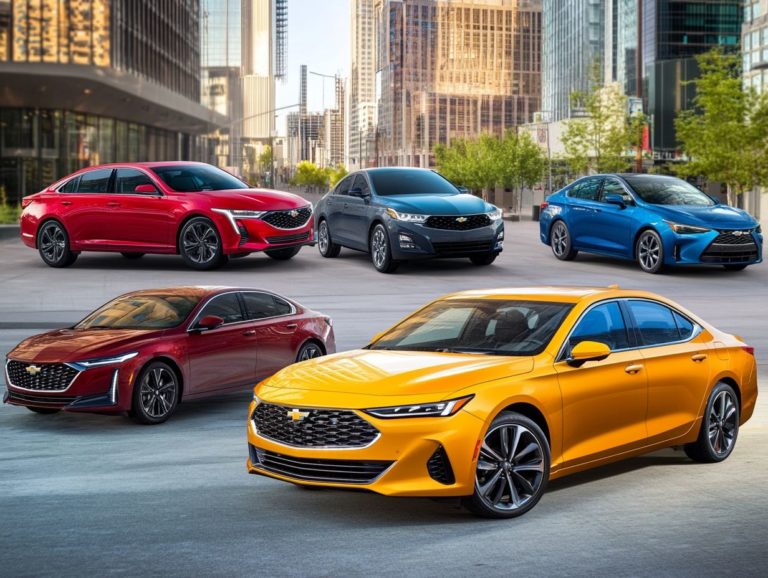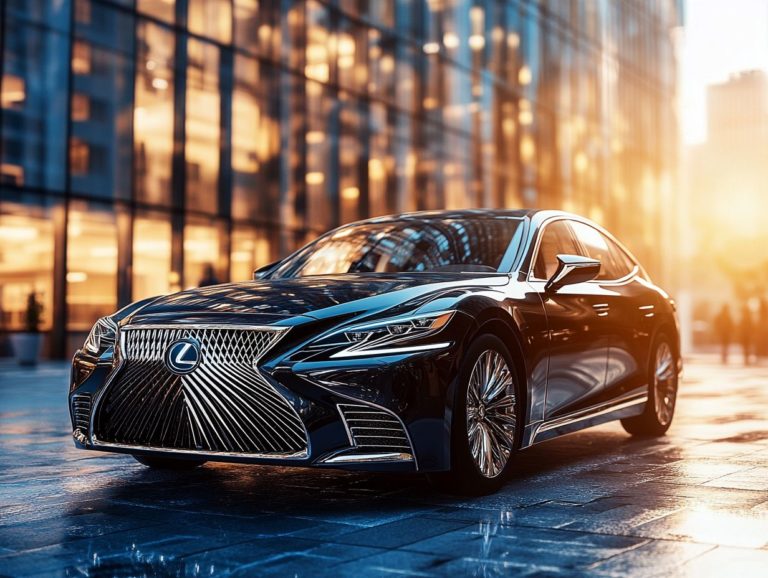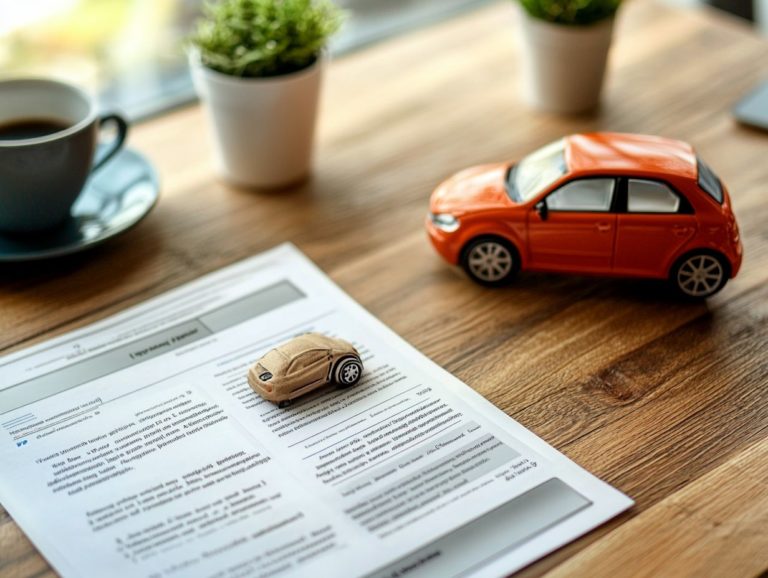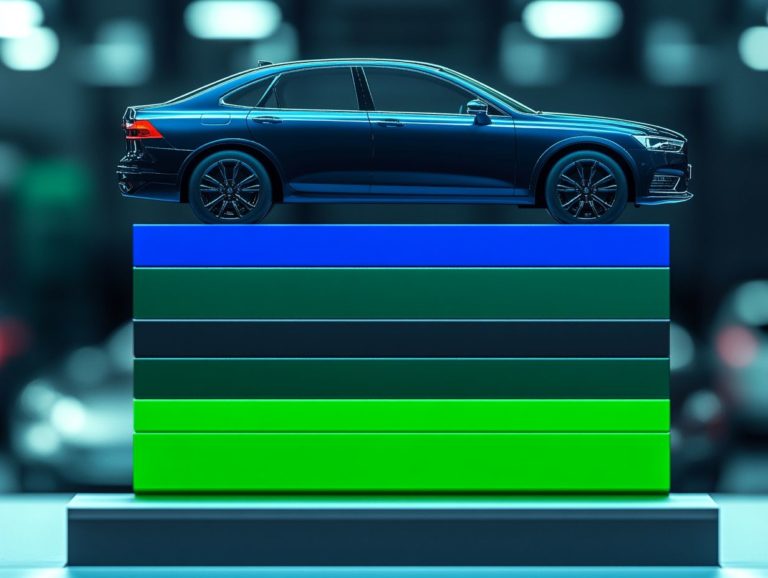Comparing Costs: Leasing vs. Buying a Car
Deciding whether to lease or buy a car is an important money decision that influences both your wallet and lifestyle.
This article gives you a straightforward comparison that can save you money! It examines the essential factors you should consider, from upfront costs and monthly payments to ongoing maintenance expenses.
It also weighs the pros and cons of each approach, guiding you through the decision-making process. Explore the insights within to uncover the best fit for your needs!
Contents
- Key Takeaways:
- Cost Comparison: Short Term and Long Term
- Factors to Consider in Decision Making
- Pros and Cons of Leasing and Buying
- Frequently Asked Questions
- What is the difference between leasing and buying a car?
- Which option is more expensive, leasing or buying a car?
- Are there any benefits to leasing a car instead of buying?
- What are the benefits of buying a car instead of leasing?
- How do I know if leasing or buying a car is the better option for me?
- Can I negotiate the cost of a lease or purchase?
Key Takeaways:
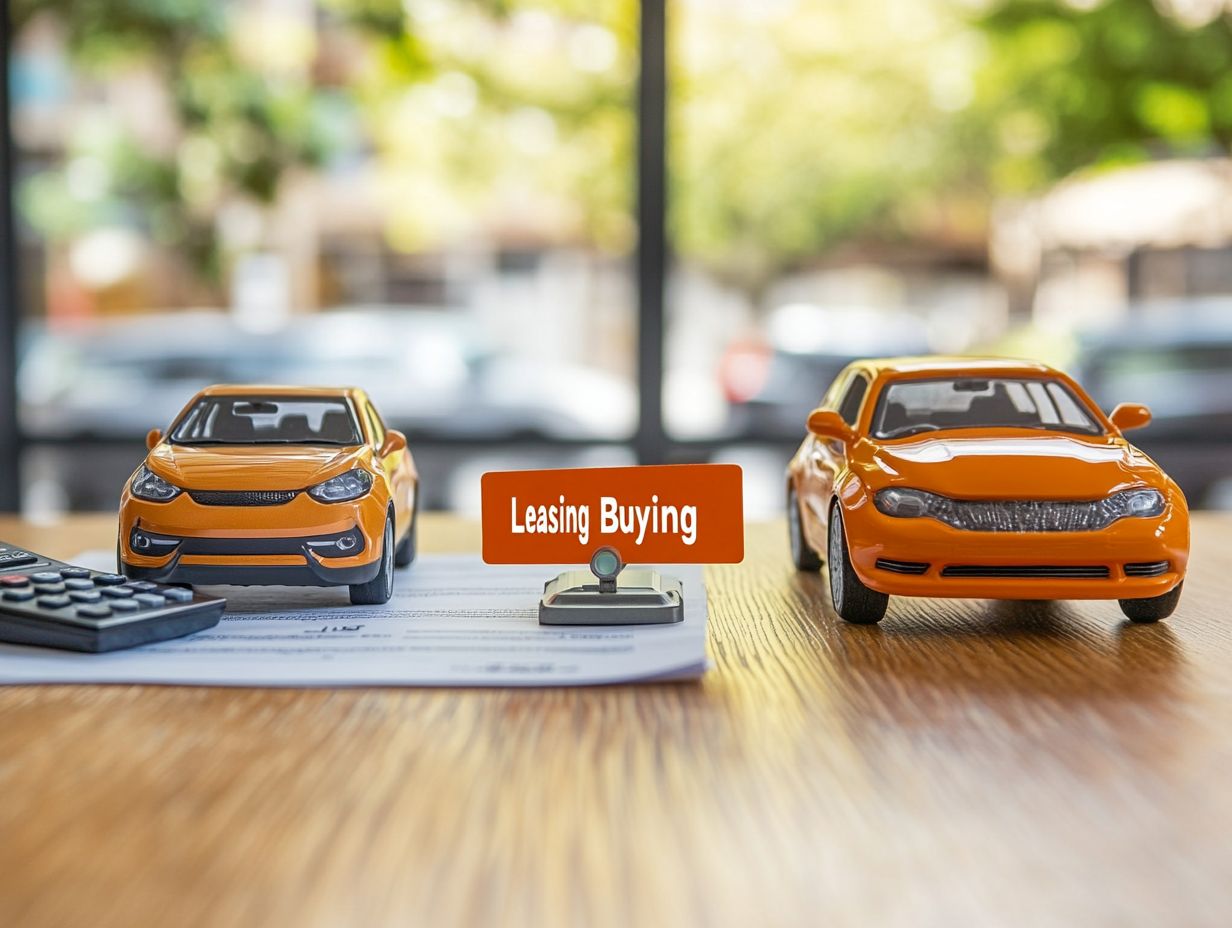
- Leasing a car may have lower upfront costs, but buying could save you money in the long run.
- Consider your personal financial situation and future plans for the car when deciding whether to lease or buy.
- Each option has its pros and cons, so weigh them carefully before making a decision.
Explanation of Leasing and Buying
Leasing and buying a vehicle each offer unique paths to ownership, and the implications on total costs, monthly payments, and long-term financial commitments are worth considering. As you weigh the decision, it’s essential to analyze several financial factors, such as upfront costs, interest rates, depreciation (the reduction in value of the vehicle over time), and the final cost of leasing a car to understand the long-term benefits of each option.
By understanding these elements, you can make more informed choices about your financial commitments and the future ramifications of ownership versus leasing.
In a leasing arrangement, you ll typically enjoy lower monthly payments since you re covering the vehicle s depreciation during the lease term rather than its full value. However, be prepared for upfront costs that might include security deposits and potential lease acquisition fees.
Conversely, buying a vehicle usually means facing higher monthly payments, which include the loan amount plus interest, along with a significant upfront cost tied to the down payment. Additionally, consider how sales tax applies; when purchasing, you’ll likely incur tax on the total purchase price, while leasing may only require tax on the monthly payments.
While depreciation affects both leasing and buying, ownership allows you to benefit from the resale value down the line, providing you with greater financial flexibility in the future.
Cost Comparison: Short Term and Long Term
When you evaluate the cost comparison between leasing and buying a car, it’s crucial to consider both the short-term and long-term financial implications. For a deeper insight, check out understanding lease vs. buy for new cars, as these factors can significantly impact your overall vehicle ownership expenses.
This analysis delves into the details of monthly payments, depreciation rates, and the total costs associated with leasing versus buying a vehicle. By doing so, you gain a clearer understanding of the lease vs. buy decision and the long-term benefits of ownership compared to the temporary perks of leasing.
Upfront Costs
Understanding the upfront costs associated with leasing versus buying a vehicle is essential as you navigate this financial decision. These initial expenses significantly impact your overall affordability.
When purchasing a car, upfront costs usually include a down payment, sales tax, and potential trade-in value. On the other hand, leasing might involve an acquisition fee, the first month’s payment, and various other fees.
A thorough financial analysis is necessary to ensure you’re making an informed choice. For example, when buying, a substantial down payment can help lower your monthly installments. However, remember to factor in the sales tax, which varies by state and can drastically increase your total initial cost.
Leasing may seem more manageable at first glance, but that acquisition fee often several hundred dollars can catch you off guard. While trade-in values can help offset costs during a purchase, they may not be available when you opt for a lease. This affects how much money you need upfront and shapes your overall financial commitment more broadly.
Monthly Payments
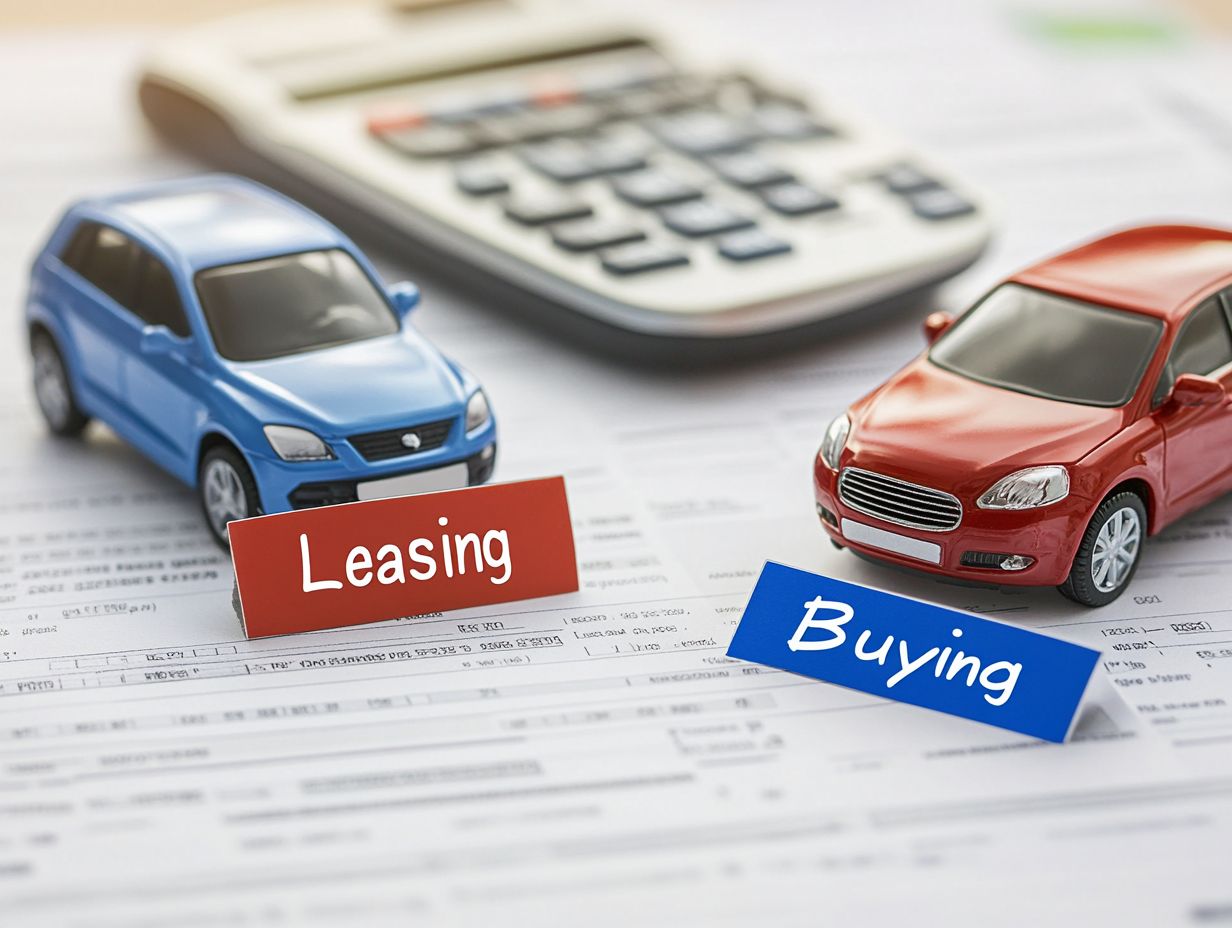
Monthly payments play a crucial role in your financial analysis when weighing the options of leasing versus buying a car. These payments represent ongoing expenses that can considerably influence your budgeting and the overall costs associated with vehicle ownership.
In a lease agreement, you ll often find that monthly payments are lower than those tied to an auto loan for purchasing a vehicle. This is because, with a lease, you re essentially paying only for the loss of value during the lease term. Buying a car typically comes with higher payments that reflect the total cost of the purchase, interest rates, and loan terms.
Interest rates can add another layer of complexity to this comparison. When you’re purchasing, a higher interest rate can significantly inflate your monthly payments, affecting your long-term financial outlook. In contrast, leases generally don’t carry the same high-interest burdens, as you’re renting the vehicle for a predetermined period. To better understand your options, consider exploring how to choose between leasing and buying. The overall cost of ownership, factoring in maintenance and repairs, is often lower with leasing since the vehicle usually remains under warranty throughout the lease duration.
Grasping these nuances enables you to make more informed financial decisions, whether you re considering buying or leasing your next vehicle. Make your choice wisely!
Maintenance and Repair Costs
Maintenance and repair costs are pivotal factors that can sway your decision to lease or buy a vehicle, as these expenses can differ greatly between the two options. When you lease, many new cars come with warranties that cover most repair costs, making leasing a more financially savvy choice in terms of immediate expenses. On the other hand, purchasing a car may lead to higher maintenance costs as the vehicle ages, which can significantly impact your overall ownership expenses.
Leasing allows you to drive the latest models equipped with cutting-edge technology, which generally require less maintenance and result in predictable, manageable costs. Conversely, once you buy a vehicle, you take on full responsibility for all repairs, and as it ages, those costs can escalate due to wear and tear.
Warranties play a crucial role in this equation, alleviating financial burdens for those opting to buy. You should evaluate the duration and coverage of warranties, as comprehensive protection can greatly influence your long-term expenses.
Ultimately, your choice between leasing and buying should not hinge solely on the initial cost. Instead, it should involve a thorough analysis of how maintenance and warranty-related factors will shape your financial landscape throughout the entire life of the vehicle. Act now to assess your options!
Factors to Consider in Decision Making
Deciding between leasing and buying a vehicle requires a thoughtful assessment of several factors that can profoundly influence your financial situation, driving habits, and future aspirations. It’s vital to grasp your current financial landscape considering your income, expenses, and lifestyle needs to determine whether leasing or buying aligns more closely with your long-term vehicle ownership goals and personal circumstances.
Your personal financial situation is a key factor when deciding whether to lease or buy a vehicle. It directly influences your ability to manage expenses like monthly payments and associated costs. Important considerations include your income, existing debts, and savings, all of which play a significant role in determining which option may be more financially sound and aligned with your lifestyle. This thoughtful assessment allows you to conduct a comprehensive financial analysis.
Beyond these basics, it’s vital to weigh the long-term implications of your choice. For instance, leasing often involves lower upfront costs and more manageable monthly payments, but it comes with mileage limits and possible fees for wear and tear. On the other hand, buying a car usually means higher monthly payments, yet it grants you the freedom of ownership and no usage restrictions, which can be particularly appealing if your needs change over time.
Ultimately, a thorough evaluation of your financial landscape will steer you toward making an informed decision that not only serves your immediate needs but also aligns with your future financial goals. Consult a financial advisor to explore your options!
Driving Habits and Needs
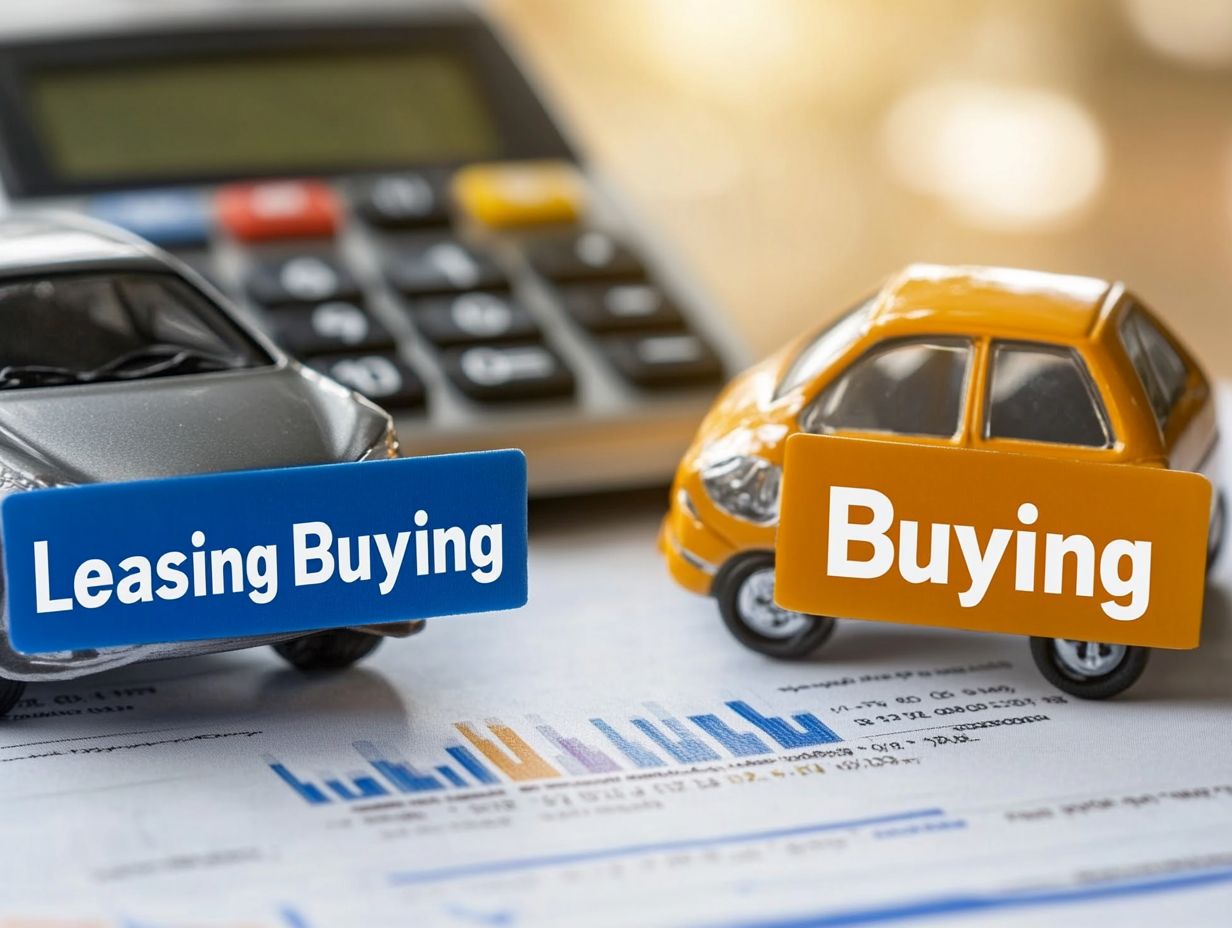
Understanding your driving habits and needs is essential when deciding whether to lease or buy a vehicle. These factors can significantly influence your overall expenses and determine which option suits you best.
If you find yourself frequently embarking on long journeys, purchasing a car might be the better route for you. Leasing typically comes with a mileage limit that could lead to excess charges. It’s crucial to align your vehicle choice with your driving patterns.
If you’re driving regularly for work or personal errands, the cumulative costs associated with leasing such as routine maintenance or insurance can escalate quickly. By taking a close look at how often you use your vehicle, you might realize that investing in a car grants you the freedom to customize it and use it without restrictions.
Conversely, if you enjoy the convenience of driving a new vehicle every few years, leasing could be a more attractive option. It often includes warranty coverage and fewer maintenance responsibilities. Grasping these nuances of your driving habits is instrumental in making a well-informed decision.
Future Plans for the Car
Your future plans for the vehicle are key. If you need it for a long time, buying is often cheaper in the long run. On the other hand, if flexibility matters more to you, leasing might be the way to go.
Evaluate factors like how often you expect to drive and whether you intend to keep the vehicle long-term. Owning a car allows you to build value over time, which can be beneficial when it comes time to sell or trade it in.
While leasing may present lower monthly payments, the recurring costs can accumulate quickly, especially if you enjoy changing vehicles frequently. Understanding the total cost implications, including maintenance and insurance, is essential since these elements impact the overall financial consequences of your decision.
Pros and Cons of Leasing and Buying
When you re weighing the pros and cons of leasing versus buying a vehicle, consider the financial implications. Think about factors such as depreciation, monthly expenses, and the long-term benefits of ownership.
Leasing offers lower monthly payments and maintenance perks, while buying allows you to build equity and enjoy long-term savings.
It s crucial to evaluate your individual needs and financial situation carefully to make the best decision for yourself. Choose the option that fits your lifestyle and financial goals!
Advantages and Disadvantages of Each Option
Examining the advantages and disadvantages of leasing vs buying a vehicle can provide you with valuable clarity as you navigate your financial choices. Each approach has its unique benefits and challenges.
Leasing typically comes with lower monthly payments and maintenance coverage, while buying allows you to enjoy complete ownership and accumulate value. This means you’ll need to conduct a thorough financial analysis to determine which option aligns best with your individual circumstances.
Leasing often includes warranty protection, leading to fewer out-of-pocket repair costs a significant plus for those who prefer a hassle-free experience. Ownership, however, grants you the freedom to modify your vehicle as you please, without the constraints often imposed by leasing agreements.
Purchasing a vehicle usually means higher upfront costs and a long-term commitment, often leading to steeper depreciation. By evaluating these factors along with mileage limits, tax effects, and potential resale value you can enable yourself to make informed decisions tailored to your specific needs and lifestyle.
Frequently Asked Questions
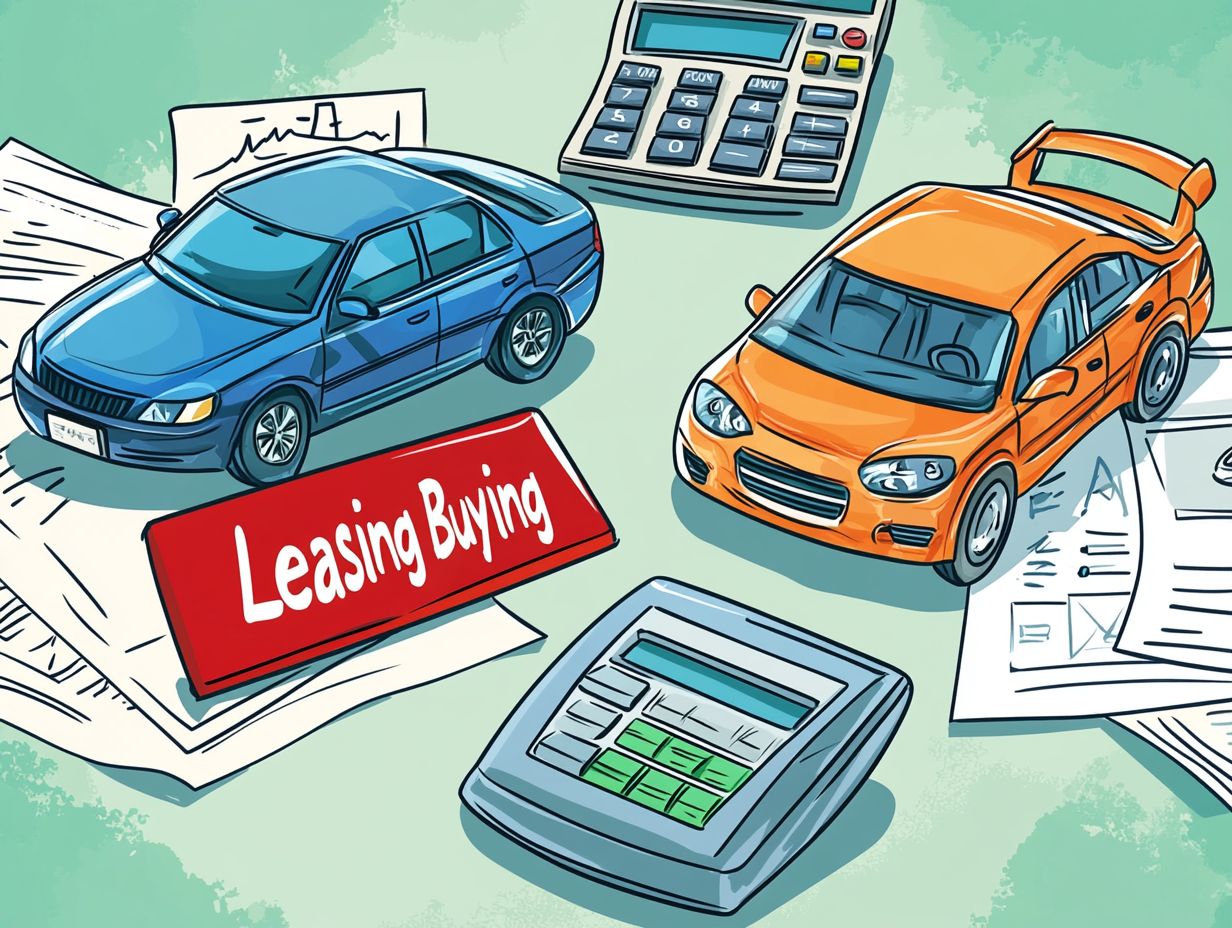
Take a moment to evaluate your driving habits. Whether you choose to lease or buy, make sure it aligns with your lifestyle!
What is the difference between leasing and buying a car?
Leasing a car means paying a monthly fee to use it for a specific time. Buying a car means owning it and making payments towards its total cost.
Which option is more expensive, leasing or buying a car?
Leasing is often more expensive due to monthly payments and mileage limits. However, costs can vary based on your situation and the car type.
Are there any benefits to leasing a car instead of buying?
Yes! Leasing offers lower monthly payments. You can also drive a new car every few years with warranty coverage.
What are the benefits of buying a car instead of leasing?
When you buy a car, it s yours! You can customize it and there are no mileage limits or extra fees at the lease’s end.
How do I know if leasing or buying a car is the better option for me?
This decision depends on your preferences and finances. Think about your budget, desired car model, and how long you plan to keep it.
Can I negotiate the cost of a lease or purchase?
Yes, you can negotiate both leasing and buying costs! Research current market prices and compare offers from dealers to score the best deal.

